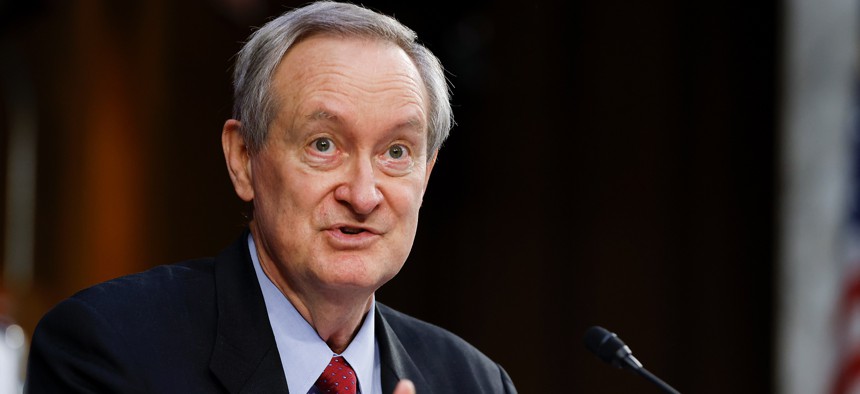Republicans unemployment fraud bill passes House, gets Senate version

Sen. Mike Crapo (R-Idaho) introduced a companion bill Friday that would clawback $400 million unobligated funds for jobless aid systems and provide states with resources to pursue improper payments. Samuel Corum / Getty Images
The bill’s passage in the House fell one day after the indictment of one of its cosponsors – Rep. George Santos (R-N.Y.) – for unemployment fraud.
The House passed a Republican-backed proposal on unemployment fraud on Thursday, and on Friday, the top Republican in the Senate Finance Committee, Sen. Mike Crapo (R-Idaho), introduced a companion bill with 14 other Republican cosponsors.
If passed, the bill would give states more time to go after overpayments and allow them to keep a cut of recovered money if they use certain anti-fraud data matching systems. The proposal also extends the statute of limitations for criminal or civil actions, something inspectors generals have been asking for, and extends staffing flexibilities around the use of contractors.
The bill would also take back around $400 million of unobligated funds for jobless aid systems included in Democrats’ American Rescue Plan Act.
Republican backers of the proposal say it would incentivize states to go after fraudsters who got with government money during the pandemic.
The bill’s author, House Ways and Means Committee chair Jason Smith (R-Mo.), argued during House debate that, “Today’s bill delivers on that accountability with common sense reforms that empower the states to make things right.”
The Labor Department’s watchdog said that at least $191 billion went out the door in improper payments between March 2020 and September 2021, although that number includes mistakes other than fraud.
The clawback of unobligated dollars from pandemic relief packages echoes a similar provision for unobligated relief dollars in House Republicans’ proposal to lift the debt limit. It passed in the House last week as Congress and the White House continue to try to find a compromise to raise the debt ceiling – something Treasury Secretary Janet Yellen says the nation could hit by June.
The anti-fraud bill faces an uphill climb in the Democrat-controlled Senate. The White House has also issued a warning that it would veto it if it were to pass.
Some Democrats have expressed concerns that the proposal could push states to go after people who got overpayments due to state mistakes, not fraud.
They also criticized the measure on the ARPA funding, something the Labor Department has said would “throttle essential, ongoing efforts to strengthen and protect the UI program from fraud.”
“Republicans are playing a dangerous game by cutting ongoing successful work by the federal government to fight fraud and leaving states to pick up the pieces,” said Rep. Danny Davis (D-Ill.), who is the top Democrat on the Ways and Means subcommittee on work and welfare.
The House bill’s passage came one day after a 13-count indictment of one of its cosponsors, Rep. George Santos (R-N.Y.), including one count of the theft of public funds.
“At the height of the pandemic in 2020, George Santos allegedly applied for and received unemployment benefits while he was employed and running for Congress,” said Anne Donnelly, district attorney for Nassau County, in the Justice Department’s announcement, which states that Santos allegedly got over $24,000 in jobless aid. Santos pleaded not guilty on all charges earlier this week.
“You cannot make it up,” Rep. Bill Pascrell (D-N.J.) said on the House floor Thursday.






